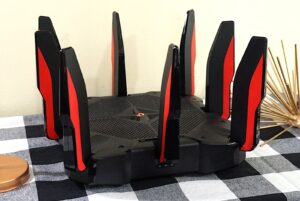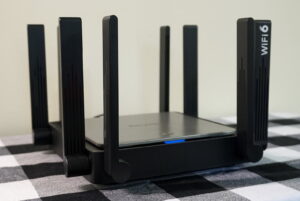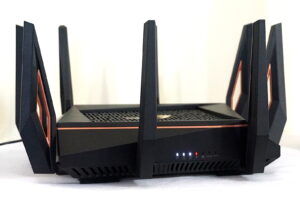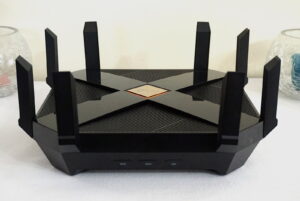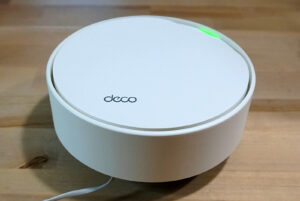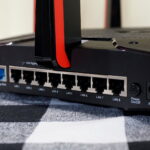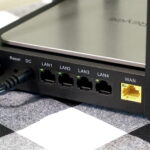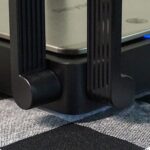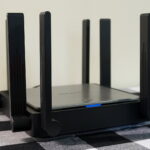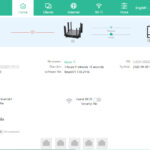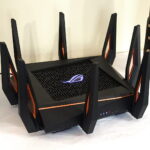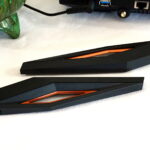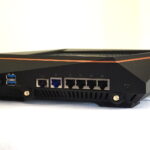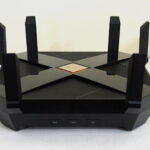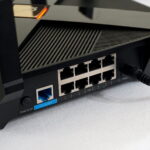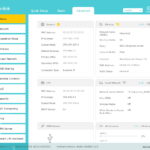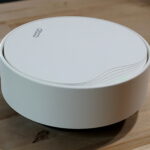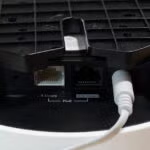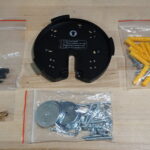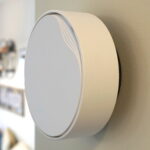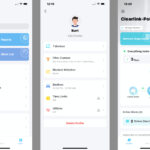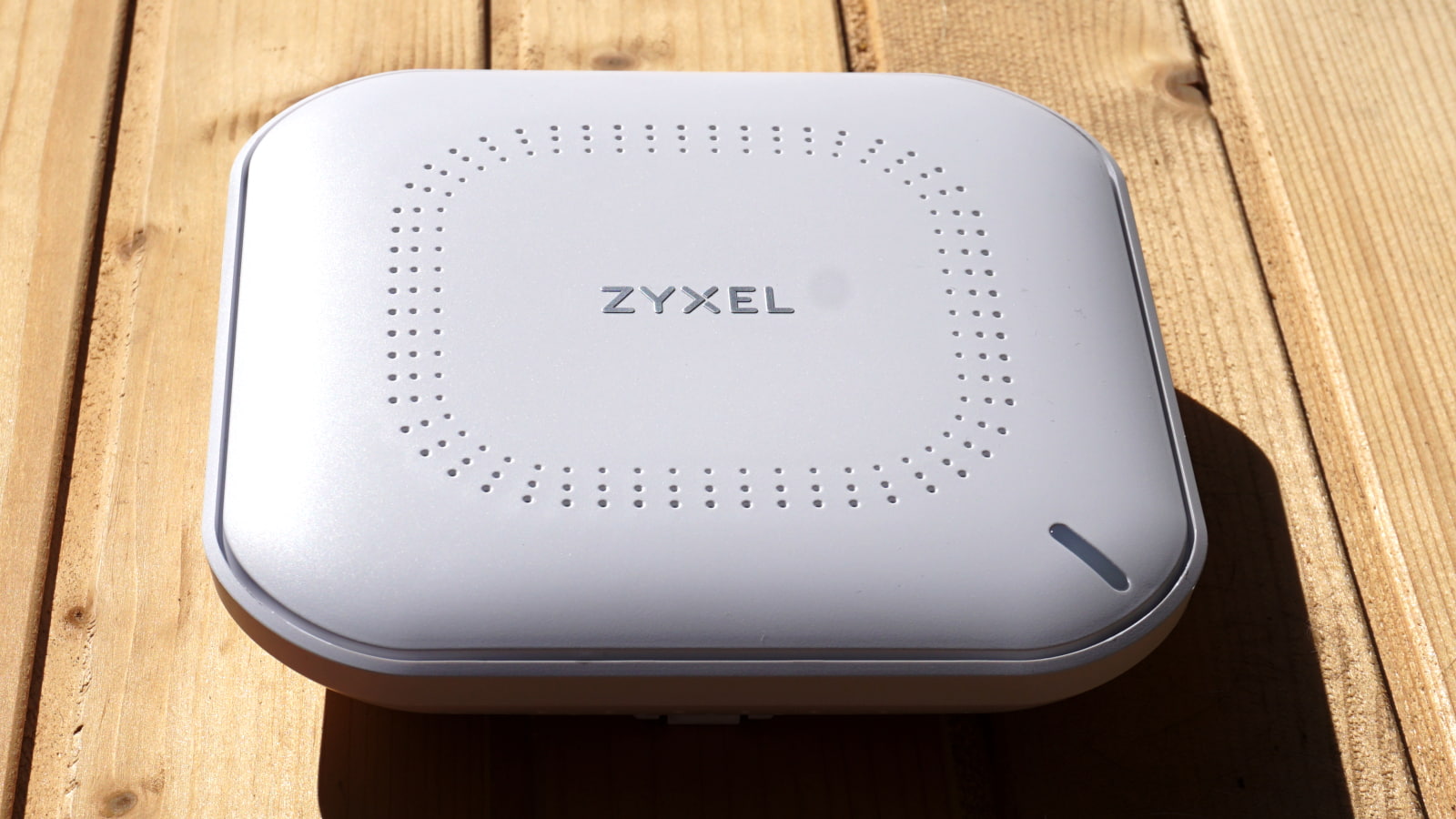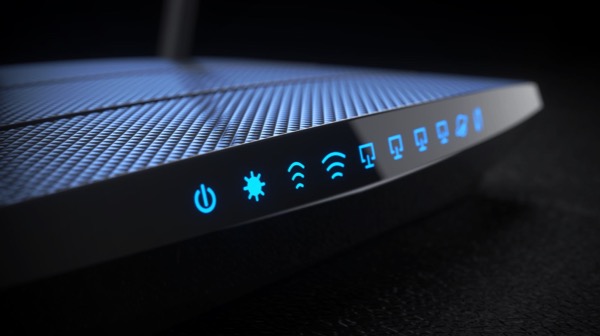Best Routers for Business in 2023
We tested over a dozen routers to see which ones are ideal for business use.
Aug 3, 2023 | Share
Equipment Guides, FAQ, Featured
-
Best overallTP-Link Archer AX11000
- $264.99*
- Eight wired ports
- Free security
- No printer sharing
-
Best for budgetsReyee RG-E5
- $119.99*
- Excellent long range
- Free cloud management
- No VPN tools
-
Best for VPNASUS ROG Rapture GT-AX11000
- $449.87*
- Free antivirus
- Printer sharing
- Hefty price tag
-
Best for rangeTP-Link Archer AX6000
- $209.99*
- Free profile controls
- Media sharing
- No third band
-
Best for meshTP-Link Deco X50-PoE
- $299.99*†
- Power over Ethernet
- Multi-gig support
- Subscription-locked features
* Amazon.com prices (as of 8/3/23 17:35 MST). Read full disclaimer.
† Price for three units.
Our pick: Which router for business is best?
We generally nominate the TP-Link Archer AX11000 as the best overall router across several categories in the mainstream space, but it’s also great for business. Sure, it targets gamers, but it’s a great solution for anyone who needs good speeds, good range, loads of extras, and plenty of wired connections for home and office use.
How we test routers
We vigorously test routers to see how well they stack up against the competition in speed and range. We also evaluate the setup process and dig into the web and mobile apps to see if they’re easy or difficult to use. Check out our methodology section for more information.
The 5 best routers for business
- Best overall: TP-Link Archer AX11000
- Best for budgets: Reyee RG-E5
- Best for VPN: ASUS ROG Rapture GT-AX11000
- Best for range: TP-Link Archer AX6000
- Best for mesh: TP-Link Deco X50-PoE
Compare business router speeds and prices
| Model | Max throughput | Tested speed @ 40 ft.† | Price* | Order online | |
|---|---|---|---|---|---|
| Best overall | TP-Link Archer AX11000 | 11,000Mbps | 692Mbps | $264.99 | View on Amazon |
| Best for budgets | Reyee RG-E5 | 3,200Mbps | 636Mbps | $119.99 | View on Amazon |
| Best for VPN | ASUS ROG Rapture GT-AX11000 | 11,000Mbps | 642Mbps | $449.87 | View on Amazon |
| Best for range | TP-Link Archer AX6000 | 6,000Mbps | 605Mbps | $209.99 | View on Amazon |
| Best for mesh | TP-Link Deco X50-PoE | 3,000Mbps | 366Mbps | $299.99‡ | View on Amazon |
* Amazon.com Prices (as of 8/3/23 9:35 MST) Read full disclaimer.
† Speed recorded using a Wi-Fi 6 client and an 80 MHz channel.
‡ Price for three units.
What should you look for in a router for business?
Security should be your top priority. All the standalone routers listed here include some type of free protection, like TP-Link’s HomeCare with built-in antivirus powered by Trend Micro. The Eero mesh network system has antivirus too, but it requires a subscription.
You should also consider your connections. Most modern routers can handle more than 60 devices simultaneously, but we encourage a high Wi-Fi stream count across all bands for less congestion and a handful of Ethernet ports for crucial wired devices, like credit card terminals.
Do you have a good business plan to go with your router?
If not, enter your zip code below to see what options are available to you.
Best overall: TP-Link Archer AX11000
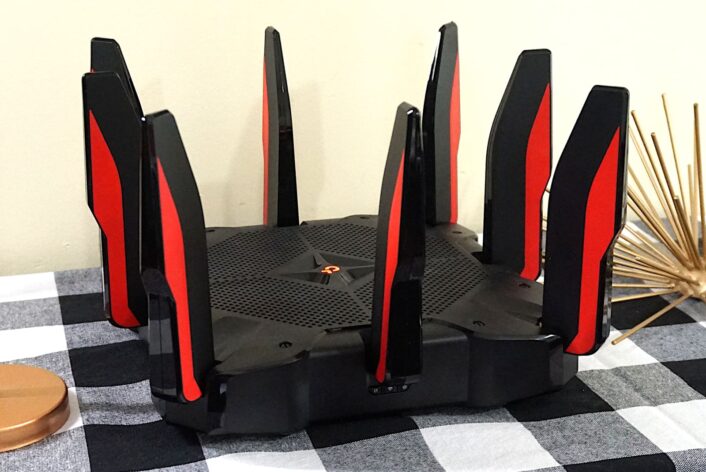 |
|
The best Gigabit-ready centerpiece for your network |
|
Score:4out of 5 |
The Archer AX11000 gives you a lot of bang for your buck: free Trend Micro security, loads of wired connectivity, and great Wi-Fi 6 speeds. It’s also ideal if you have a multi-gig internet connection. |
| Pros | Cons |
|
|
$264.99*
* Amazon.com Price (as of 8/3/23 9:35 MST). Read full disclaimer.
Expand for product details and ratings
| Category | Score* | Summary |
| Performance | 4 | Provides great Wi-Fi 6 speeds in our tests even at 100 feet. |
| Features | 4 | Includes free antivirus from Trend Micro and easy client profile controls. |
| Design | 4 | Provides a 2.5Gbps internet port, plus eight Gigabit Ethernet ports for wired devices. |
| Setup | 4 | Gets your network running quickly, whether you use a browser or the Tether app. |
| Ease of use | 4 | Employs the best interface of all the TP-Link routers we’ve tested. |
* out of 5 points
What we like about it: The Archer AX11000 has some of the best Wi-Fi 6 speeds we’ve tested to date, even at 120 feet. There’s plenty of wired connectivity, too, for all your crucial devices, plus free Trend Micro security and client profile controls to keep your employees safe and focused.
What we wish it did better: It needs a shorter setup process—or at least split the process up into Basic and Advanced, so novice users get up and running quickly. Plus, it lacks a built-in VPN client, which means you still need VPN software installed on your devices.
Why do we recommend it? The Archer AX11000 is a great solution for businesses that don’t need enterprise-grade features. It can handle a fleet of employees with ease and keeps them safe online without any additional cost to you.
Tested speeds at a glance
| 5 GHz max speed | 2 feet | 40 feet | 120 feet |
| 1,200 | 860 | 692 | 282 |
* Speeds in megabits per second (Mbps) using a Wi-Fi 6 client and an 80 MHz channel.
| Wi-Fi specs | Wired specs |
|
|
Best for budgets: Reyee RG-E5
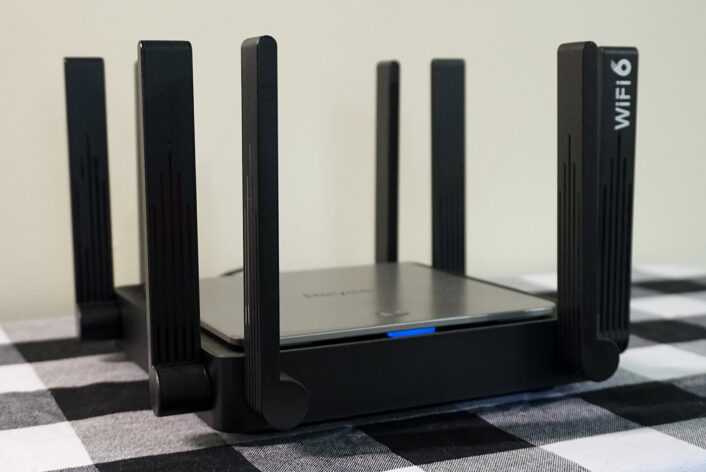 |
|
A business-class router at a friendly price |
|
Score:3.8out of 5 |
The Reyee RG-E5 is a business-first router with great long-range speeds. It includes free access to a cloud management platform for managing multiple Reyee access points. |
| Pros | Cons |
|
|
$119.99*
* Amazon.com Price (as of 8/3/23 9:35 MST). Read full disclaimer.
Expand for product details and ratings
| Category | Score* | Summary |
| Performance | 4 | Has the best long-range speeds for a router under $150. |
| Features | 3 | Provides an ARP Guard and free Ruijie Cloud account. |
| Design | 3 | Lacks multi-gig internet support and VPN tools. |
| Setup | 4 | Has one of the fastest setups we’ve tested to date. |
| Ease of use | 4 | Requires the web and mobile app to use fully. |
* out of 5 points
What we like about it: The RG-E5 has great long-range speeds at this price. Moreover, it has some of the best speed consistencies we’ve seen to date, meaning you don’t see a dramatic speed dropoff as you move away from the router.
Ruijie Cloud is useful, too, if you need to manage multiple Reyee devices installed across the globe.
What we wish it did better: The RG-E5 is the only Wi-Fi 6 router we have in-house that doesn’t support the latest security standard, WPA3, which is more secure than WPA2. Plus, it lacks in many other areas like VPN and wired multi-gig connectivity.
Why do we recommend it? The Reyee RG-E5 is a high-performance router at the $150 price point. It lacks in some areas, sure, but if consistent speed is what you need across a long range, this is the router for your business.
Tested speeds at a glance
| 5 GHz max speed | 2 feet | 40 feet | 120 feet |
| 1,200 | 843 | 636 | 330 |
* Speeds in megabits per second (Mbps) using a Wi-Fi 6 client and an 80 MHz channel.
| Wi-Fi specs | Wired specs |
|
|
Best for VPN: ASUS ROG Rapture GT-AX11000
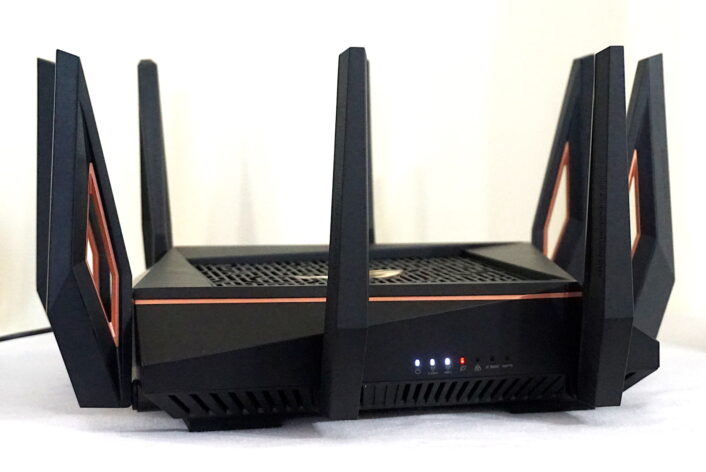 |
|
A full-featured solution any business should love |
|
Score:4.1out of 5 |
The GT-AX11000 is our highest-rated router to date. It checks all the right boxes, including built-in VPN tools, mesh networking support, and good Wi-Fi 6 speed at long range. |
| Pros | Cons |
|
|
$449.87*
* Amazon.com Price (as of 8/3/23 9:35 MST). Read full disclaimer.
Expand for product details and ratings
| Category | Score* | Summary |
| Performance | 4 | Provides some of the best Wi-Fi 6 speeds to date, even at a range of 120 feet. |
| Features | 5 | Includes free antivirus, device profile controls, and built-in VPN tools. |
| Design | 4 | Supports 6 wireless devices at full speed; 12 at half speed. |
| Setup | 4 | Takes longer due to all the extras you normally don’t get on a standard router. |
| Ease of use | 4 | Provides a better experience in the web interface than the mobile app. |
* out of 5 points
What we like about it: This router definitely has a lot to love. Its biggest selling point is capacity: three bands and 12 streams. The free antivirus, client profile controls, and built-in VPN server and client that keep you anonymous online also sweeten the deal.
What we wish it did better: We found the antennas problematic—at least on the model we purchased. No matter how hard we screwed the antennas into place, some of them fell over time.
Why do we recommend it? The GT-AX11000 is a great router for anyone. You get free antivirus, decent client profile controls, multi-gig internet support, and VPN tools to keep you safe online. It’s ideal for businesses with lots of devices if you can handle the price.
Tested speeds at a glance
| 5 GHz max speed | 2 feet | 40 feet | 120 feet |
| 1,200 | 848 | 642 | 260 |
* Speeds in megabits per second (Mbps) using a Wi-Fi 6 client and an 80 MHz channel.
| Wi-Fi specs | Wired specs |
|
|
Best for range: TP-Link Archer AX6000
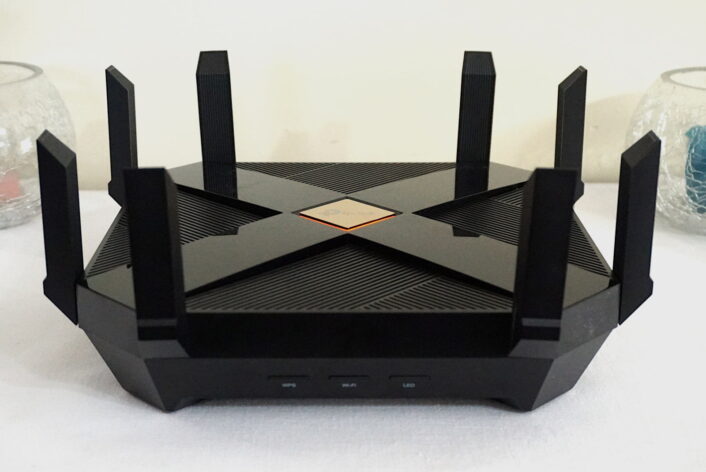 |
|
A fully-featured router at a great price |
|
Score:3.9out of 5 |
The AX6000 is an awesome router for the money, although it lacks the third band and extra streams offered with the Archer AX11000. It has great Wi-Fi speeds, great range, and plenty of wired ports. |
| Pros | Cons |
|
|
$209.99*
* Amazon.com Price (as of 8/3/23 9:35 MST). Read full disclaimer.
Expand for product details and ratings
| Category | Score* | Summary |
| Performance | 4 | Has some of the fastest Wi-Fi 6 speeds we’ve tested to date, even at long range. |
| Features | 4 | Includes a VPN server and a free subscription to HomeCare for the life of the router. |
| Design | 4 | Packs a 2.5Gbps WAN port and loads of wired connectivity. |
| Setup | 3 | Takes longer than it should compared to the tested setup times on competing routers. |
| Ease of use | 4 | Offers a better experience through the Tether app than the web interface. |
* out of 5 points
What we like about it: Like the Archer AX11000, this router has loads of wired connectivity, a 2.5Gbps WAN port, and TP-Link’s free HomeCare suite. It has great Wi-Fi 6 speeds, too, even when we tested it at 120 feet.
What we wish it did better: At this price, we’re not sure why TP-Link didn’t add a VPN client to complement the built-in server. We also wish the web interface had a dark mode, but that’s true for all TP-Link routers, not this one only.
Why do we recommend it? It’s a great router overall for the money, packing support for 2.5Gbps internet and loads of Wi-Fi 6 speed—even at a long range. You simply can’t go wrong with this one.
Tested speeds at a glance
| 5 GHz max speed | 2 feet | 40 feet | 120 feet |
| 1,200 | 849 | 605 | 280 |
* Speeds in megabits per second (Mbps) using a Wi-Fi 6 client and an 80 MHz channel.
| Wi-Fi specs | Wired specs |
|
|
Best for mesh: TP-Link Deco X50-PoE
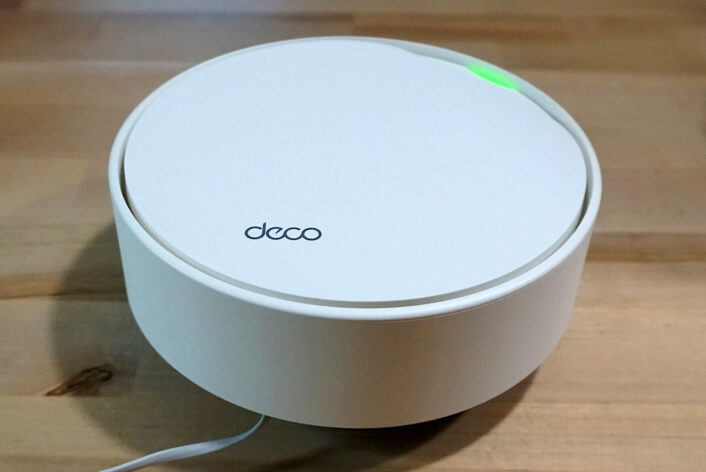 |
|
A great mesh system you can mount nearly anywhere |
|
Score:3.9out of 5 |
The Deco X50-PoE is ideal if your business needs a mesh system you can mount on ceilings and walls. But be prepared to make additional investments if you want to take full advantage of everything this system has to offer. |
| Pros | Cons |
|
|
$299.99*†
* Amazon.com Price (as of 8/3/23 9:35 MST). Read full disclaimer.
† Price for three units.
Expand for product details and ratings
| Category | Score* | Summary |
| Performance | 4 | Tests with decent Wi-Fi 6 speeds similar to other rival mesh systems |
| Features | 3 | Requires a subscription for security features. |
| Design | 4 | Includes Power over Ethernet networking and multi-gig internet support. |
| Setup | 4 | Has one of the fastest setups we’ve seen to date. |
| Ease of use | 4 | Provides easy network management through the well-designed Deco app. |
* out of 5 points
What we like about it: You can mount this kit on a wall or ceiling anywhere indoors—you don’t even need a local power outlet to keep these units online. Plus, the multi-gig internet port and 160 MHz channels ensure you have access to sub-2Gbps wireless speeds, but we already tested decent speeds using a narrower 80 MHz channel.
What we wish it did better: Like most all other mesh systems, you must pay extra for security features. And like most other mesh systems, you may encounter slowdowns since they’re not designed to handle an army of devices all at once.
Why do we recommend it? The Deco X50-PoE is a good choice if you need access points mounted beyond the reach of employees and customers. It’s a good, affordable solution if you have a 1–2Gbps internet connection.
Tested speeds at a glance
| 5 GHz max speed | 2 feet | 40 feet | 120 feet |
| 1,200 | 821 | 366 | 83 |
* Speeds in megabits per second (Mbps) using a Wi-Fi 6 client and an 80 MHz channel.
| Wi-Fi specs | Wired specs |
|
|
Business router specs and features
You’ll find plenty of arguments online saying you should never use a consumer router in a business, and for a corporate environment, that’s true. But if you have a small business and don’t need all the extra (and costly) bloat, here are a few tidbits to consider when you shop for a new router.
Ethernet
Wi-Fi is convenient, but it’s not as secure as a wired Ethernet connection. Hackers can’t easily eavesdrop on a wired connection and steal your sensitive data without physical access to the network. Plus, security cameras, point-of-sale devices, credit card terminals, and similar devices sometimes require an Ethernet connection. We gravitate to routers with more than four ports to reduce the need for an Ethernet hub.
Built-in VPN
A built-in VPN server allows you and your fellow co-workers to access the internet anonymously no matter where you are geographically—you don’t need a subscription to use it. A VPN client connects to your VPN subscription and protects all your local network devices, including those that don’t support VPN software.
Security
A router needs more than just a basic firewall as your first line of defense against threats. Some routers include free antivirus, while others require a subscription. Should you still have antivirus installed on your computer? Most definitely.
Profiles
Generally, parents use profiles to manage children, but you can use them on adults too. You can apply filters to keep NSFW content off company screens, set internet downtimes, and block specific devices that have no business accessing your Wi-Fi.
A note about USB
USB connectivity on a router generally isn’t ideal in a business environment. Someone could attach a USB stick full of nasty malware and wreak havoc on the network. But generally, you must configure a USB port for a specific function before you can even use it. Several routers on this list include a USB port or two, so for peace of mind, close them off with a set of USB port caps.
And one last thing…
USB connectivity on a router generally isn’t ideal in a business environment. Someone could attach a USB stick full of nasty malware and wreak havoc on the network. But generally, you must configure a USB port for a specific function before you can even use it. Several routers on this list include a USB port or two, so for peace of mind, close them off with a set of USB port caps.
Our verdict
Most of the routers we have on-hand target consumers. The Reyee RG-E5 is the only business-first router we have in-house and tested, and it’s a good solution if you’re on a budget. But we still stick by the TP-Link Archer AX11000 as our favorite for this category until we get our hands on more business-class routers.
And sure, we totally get the Archer AX11000 pretends to be a gaming router. Your business partners will probably arch a brow upon sight of it. But in its defense, TP-Link’s router has great speeds at long range, supports mesh networking, has loads of wired connectivity, and supports multi-gig internet. All that goodness is packed into a highly digestible price that can’t be beat.
Methodology
We test router speed by setting up each router in an office and connecting it to a local test server. Then, we transmit test data between our wireless devices and the server, taking numerous measurements to account for fluctuations in Wi-Fi speeds.
The first tests occur close to the router, without obstructions—so the Wi-Fi is as strong and fast as it’s gonna get. We repeat the process straight out at 10, 20, and 30 feet, with only a glass door obstructing our view of the router. The same glass door and an exterior door blocks our path when we test outside at 40 and 50 feet.
We also run tests in a hallway to the left of the TV room and office—where there’s a glass door, three walls, and an air handler unit blocking our view of the router. The dining room, another testing point, sits to the right of the kitchen, TV room, and office—two walls and a glass door block the path in this test.
To test video streaming, we connect a fast storage device to the router and stream a 4K video to six wireless devices simultaneously—two phones, three tablets, and a laptop—connected to the same wireless band.
Client devices used in testing
| iPhone 12 Pro Max | Google Pixel 3 | |
|---|---|---|
| Wi-Fi specification | Wi-Fi 6 | Wi-Fi 5 |
| Stream configuration | 2 x 2 | 2 x 2 |
| Max 5 GHz speed (AX) | 1,200Mbps | – |
| Max 5 GHz speed (AC) | 866Mbps | 866Mbps |
| Max 2.4 GHz speed (AX) | 195Mbps | – |
| Max 2.4 GHz speed (N) | 144Mbps | 144Mbps |
| Wi-Fi specification | |
| iPhone 12 Pro Max | Wi-Fi 6 |
| Google Pixel 3 | Wi-Fi 5 |
| Stream configuration | |
| iPhone 12 Pro Max | 2 x 2 |
| Google Pixel 3 | 2 x 2 |
| Max 5 GHz speed (AX) | |
| iPhone 12 Pro Max | 1,200Mbps |
| Google Pixel 3 | – |
| Max 5 GHz speed (AC) | |
| iPhone 12 Pro Max | 866Mbps |
| Google Pixel 3 | 866Mbps |
| Max 2.4 GHz speed (AX) | |
| iPhone 12 Pro Max | 195Mbps |
| Google Pixel 3 | – |
| Max 2.4 GHz speed (N) | |
| iPhone 12 Pro Max | 144Mbps |
| Google Pixel 3 | 144Mbps |
Router benchmarks
Here are the average 5 GHz speeds recorded for each router. Wi-Fi speeds fluctuate significantly, so these numbers reflect at least three tests taken at each 10-foot interval.
TP-Link Archer AX11000
| iPhone 12 Pro Max | Google Pixel 3 | |
|---|---|---|
| 2 feet | 860 | 658 |
| 10 feet | 848 | 645 |
| 20 feet | 768 | 572 |
| 30 feet | 745 | 453 |
| 40 feet (porch) | 692 | 330 |
| 120 feet (neighbor) | 282 | 175 |
| 2 feet | |
| iPhone 12 Pro Max | 860 |
| Google Pixel 3 | 658 |
| 10 feet | |
| iPhone 12 Pro Max | 848 |
| Google Pixel 3 | 645 |
| 20 feet | |
| iPhone 12 Pro Max | 768 |
| Google Pixel 3 | 572 |
| 30 feet | |
| iPhone 12 Pro Max | 745 |
| Google Pixel 3 | 453 |
| 40 feet (porch) | |
| iPhone 12 Pro Max | 692 |
| Google Pixel 3 | 330 |
| 120 feet (neighbor) | |
| iPhone 12 Pro Max | 282 |
| Google Pixel 3 | 175 |
* Speeds in megabits per second (Mbps) using an 80 MHz channel.
Reyee RG-E5
| iPhone 12 Pro Max | Google Pixel 3 | |
|---|---|---|
| 2 feet | 843 | 695 |
| 10 feet | 842 | 692 |
| 20 feet | 789 | 656 |
| 30 feet | 725 | 646 |
| 40 feet (porch) | 636 | 445 |
| 120 feet (neighbor) | 330 | 143 |
| 2 feet | |
| iPhone 12 Pro Max | 843 |
| Google Pixel 3 | 695 |
| 10 feet | |
| iPhone 12 Pro Max | 842 |
| Google Pixel 3 | 692 |
| 20 feet | |
| iPhone 12 Pro Max | 789 |
| Google Pixel 3 | 656 |
| 30 feet | |
| iPhone 12 Pro Max | 725 |
| Google Pixel 3 | 646 |
| 40 feet (porch) | |
| iPhone 12 Pro Max | 636 |
| Google Pixel 3 | 445 |
| 120 feet (neighbor) | |
| iPhone 12 Pro Max | 330 |
| Google Pixel 3 | 143 |
* Speeds in megabits per second (Mbps) using an 80 MHz channel.
ASUS ROG Rapture GT-AX11000
| iPhone 12 Pro Max | Google Pixel 3 | |
|---|---|---|
| 2 feet | 848 | 652 |
| 10 feet | 827 | 644 |
| 20 feet | 755 | 529 |
| 30 feet | 729 | 462 |
| 40 feet (porch) | 642 | 308 |
| 120 feet (neighbor) | 260 | 169 |
| 2 feet | |
| iPhone 12 Pro Max | 848 |
| Google Pixel 3 | 652 |
| 10 feet | |
| iPhone 12 Pro Max | 827 |
| Google Pixel 3 | 644 |
| 20 feet | |
| iPhone 12 Pro Max | 755 |
| Google Pixel 3 | 529 |
| 30 feet | |
| iPhone 12 Pro Max | 729 |
| Google Pixel 3 | 462 |
| 40 feet (porch) | |
| iPhone 12 Pro Max | 642 |
| Google Pixel 3 | 308 |
| 120 feet (neighbor) | |
| iPhone 12 Pro Max | 260 |
| Google Pixel 3 | 169 |
* Speeds in megabits per second (Mbps) using an 80 MHz channel.
TP-Link Archer AX6000
| iPhone 12 Pro Max | Google Pixel 3 | |
|---|---|---|
| 2 feet | 849 | 621 |
| 10 feet | 832 | 576 |
| 20 feet | 782 | 459 |
| 30 feet | 721 | 413 |
| 40 feet (porch) | 605 | 251 |
| 120 feet (neighbor) | 280 | 123 |
| 2 feet | |
| iPhone 12 Pro Max | 849 |
| Google Pixel 3 | 621 |
| 10 feet | |
| iPhone 12 Pro Max | 832 |
| Google Pixel 3 | 576 |
| 20 feet | |
| iPhone 12 Pro Max | 782 |
| Google Pixel 3 | 459 |
| 30 feet | |
| iPhone 12 Pro Max | 721 |
| Google Pixel 3 | 413 |
| 40 feet (porch) | |
| iPhone 12 Pro Max | 605 |
| Google Pixel 3 | 251 |
| 120 feet (neighbor) | |
| iPhone 12 Pro Max | 280 |
| Google Pixel 3 | 123 |
* Speeds in megabits per second (Mbps) using an 80 MHz channel.
TP-Link Deco X50-PoE
| iPhone 12 Pro Max | Google Pixel 3 | |
|---|---|---|
| 2 feet | 821 | 618 |
| 10 feet | 719 | 561 |
| 20 feet | 657 | 497 |
| 30 feet | 593 | 405 |
| 40 feet (porch) | 366 | 258 |
| 120 feet (neighbor) | 83 | 6 |
| 2 feet | |
| iPhone 12 Pro Max | 821 |
| Google Pixel 3 | 618 |
| 10 feet | |
| iPhone 12 Pro Max | 719 |
| Google Pixel 3 | 561 |
| 20 feet | |
| iPhone 12 Pro Max | 657 |
| Google Pixel 3 | 497 |
| 30 feet | |
| iPhone 12 Pro Max | 593 |
| Google Pixel 3 | 405 |
| 40 feet (porch) | |
| iPhone 12 Pro Max | 366 |
| Google Pixel 3 | 258 |
| 120 feet (neighbor) | |
| iPhone 12 Pro Max | 83 |
| Google Pixel 3 | 6 |
* Speeds in megabits per second (Mbps) using an 80 MHz channel.
Other routers we tested
We tested over a dozen routers and mesh kits to determine which ones were ideal for business. Here are the tested models we do and don’t recommend.
Other routers we recommend for business
| Model | Summary | Price* | Shop online |
|---|---|---|---|
| TP-Link Archer AX90 | Includes VPN tools, three bands, and multi-gig internet support. | $304.15 | View on Amazon |
| Asus RT-AX68U | Supports dual internet connections, including 3G/4G cellular wireless dongles. | $129.99 | View on Amazon |
* Amazon.com Prices (as of 8/3/23 9:35 MST). Read full disclaimer.
Other routers we don’t recommend for business
| Model | Summary | Price* | More details |
|---|---|---|---|
| NETGEAR Nighthawk RAX200 | Requires several subscriptions to use this router fully. | $609.99 | View on Amazon |
| Linksys EA8300 | Uses the Wi-Fi 5 spec, so it doesn’t have the latest security features. | $62.50 | View on Amazon |
* Amazon.com Price (as of 8/3/23 9:35 MST). Read full disclaimer.
FAQ about routers for business
How do the TP-Link routers support mesh?
The two TP-Link routers listed here fall within its OneMesh product family. This group also includes extenders and powerline adapters you can pair with a compatible router. TP-Link provides a list of compatible OneMesh devices.
How does the ASUS router support mesh?
Certain ASUS routers include AiMesh technology. Unlike TP-Link’s OneMesh, you must pair two AiMesh routers to create a mesh network. ASUS provides a list of compatible AiMesh routers.
How does the Reyee router support mesh?
You can pair multiple routers with Reyee Mesh technology to create a mesh network. Ruijie Networks provides a list of compatible Reyee Mesh devices.
Disclaimer
Amazon.com Prices as of 8/3/23 9:35 MST. Product prices and availability are accurate as of the date/time indicated and are subject to change. Any price and availability information displayed on Amazon.com at the time of purchase will apply to the purchase of this product. Highspeedinternet.com utilizes paid Amazon links.
CERTAIN CONTENT THAT APPEARS ON THIS SITE COMES FROM AMAZON. THIS CONTENT IS PROVIDED ‘AS IS’ AND IS SUBJECT TO CHANGE OR REMOVAL AT ANY TIME.
Author - Kevin Parrish
Kevin Parrish has more than a decade of experience working as a writer, editor, and product tester. He began writing about computer hardware and soon branched out to other devices and services such as networking equipment, phones and tablets, game consoles, and other internet-connected devices. His work has appeared in Tom’s Hardware, Tom's Guide, Maximum PC, Digital Trends, Android Authority, How-To Geek, Lifewire, and others. At HighSpeedInternet.com, he focuses on network equipment testing and review.
